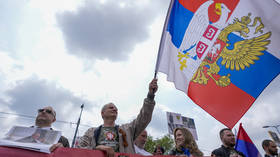
President Aleksandar Vucic said his intelligence links tipped him off to foreign-funded revolutionaries lurking among protesters

Protesters march during a rally to call for the resignation of top officials in Belgrade, Serbia, May 19, 2023 © AFP / Andrej Isakovic
Serbian President Aleksandar Vucic said on Friday that his intelligence contacts tipped him off about the presence of foreign-sponsored revolutionaries at so-called anti-violence rallies in Belgrade. The West, he declared, has been “causing problems” for Serbia ever since Belgrade refused “to hand them Kosovo on a platter.”
Thousands of protesters and a group of opposition politicians marched in Belgrade on Friday, demanding the resignation of Interior Minister Bratislav Gasic and intelligence chief Aleksandar Vulin. Successive demonstrations have been held in the Serbian capital since 17 people – including eight children – were killed in a pair of back-to-back mass shootings earlier this month.
According to RT Balkan, some of the demonstrators on Friday demanded that Vucic also step down.
“Today I have received information from our sister services from the East telling us ‘these are attempts at color revolutions’,” Vucic said at a rally. “I told them I don’t know what they’re attempting, I only know that these are disgusting attempts to abuse the tragic deaths of some children.”

Read more
Vucic did not state which countries’ intelligence agents had tipped him off about the apparent plot against his government.
“Serbia is fed up with your revolutions,” he declared. “Serbia is fed up with the arrival of those under foreign influence and the destruction of everything that is Serbian.”
“I will not threaten any of them,” he said, referring to Serbian protesters he views as working against the country’s interests. “But we will not allow them to forcefully and illegally lead a policy against our national interests.”
The term ‘color revolution’ describes a protest movement funded and organized by a Western government – usually the United States. Aimed at toppling leaders opposed to US interests, these revolutions are typically backed by American intelligence agencies, and organized by a panoply of US-funded NGOs. While the term became widely known following the 2003 ‘Rose Revolution’ in Georgia, the first successful use of color revolution tactics took place in Yugoslavia in 2000, when a US-backed student movement forced the resignation of Slobodan Milosevic.
Milosevic had fought off a violent secession attempt by ethnic Albanian terrorists in Kosovo a year earlier, relenting with NATO occupation of the province and only after the US-led bloc subjected Serbian cities to a three-month bombing campaign.
READ MORE: China won’t forget NATO’s ‘barbaric’ acts in Yugoslavia – Foreign Ministry
Serbia’s continued refusal to acquiesce to the West’s demands and recognize Kosovo’s independence, Vucic said on Friday, has made his country a target for foreign interference ever since.
“They expected us to hand over the Republic of Kosovo to them on a platter and say ‘we have reconciled, you were right to bomb us’,” Vucic said, adding that he would “never surrender,” and “never let them make Kosovo independent.”




